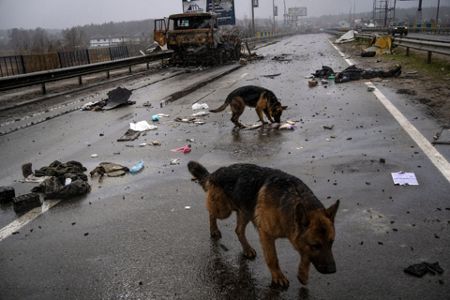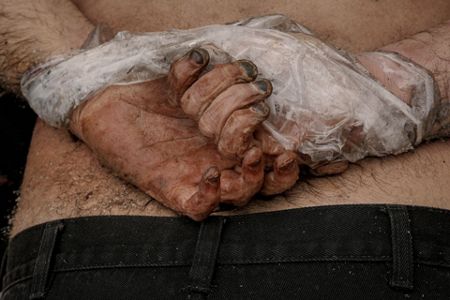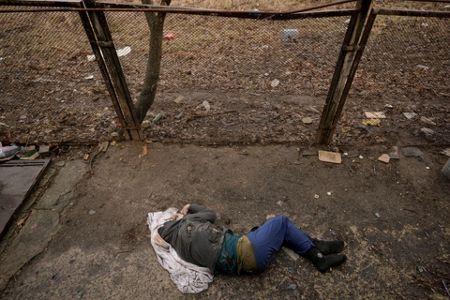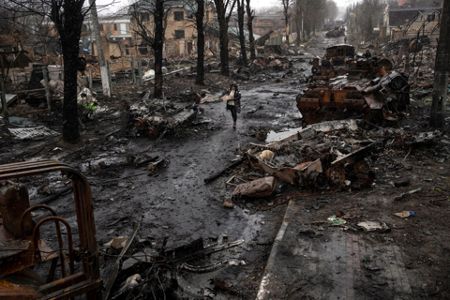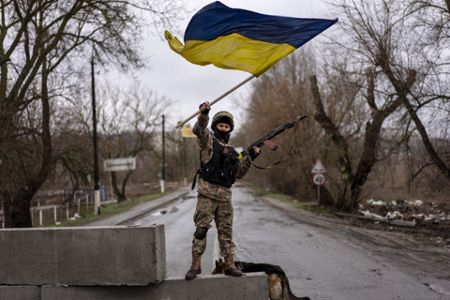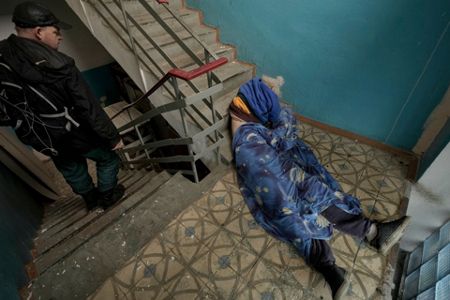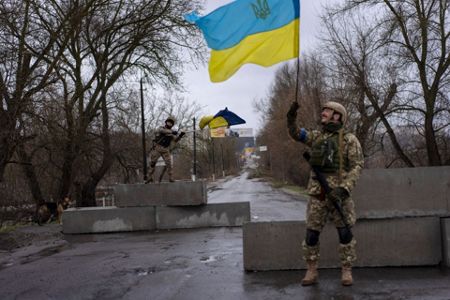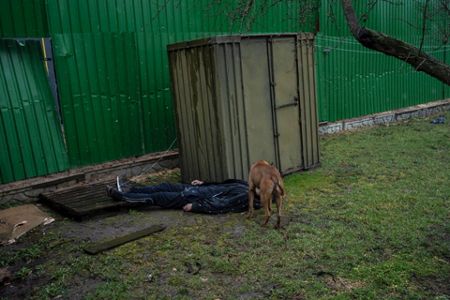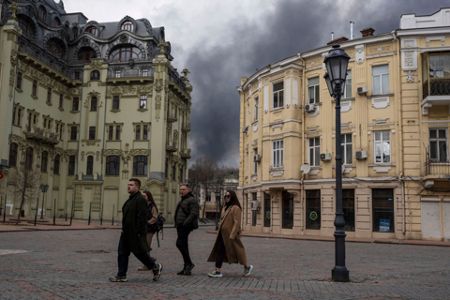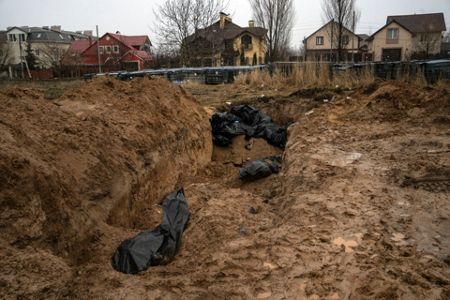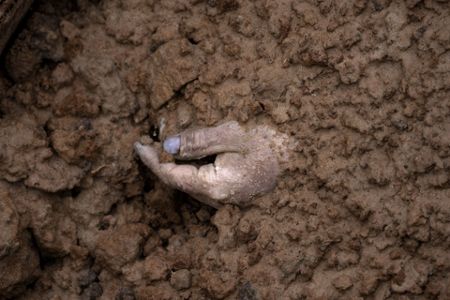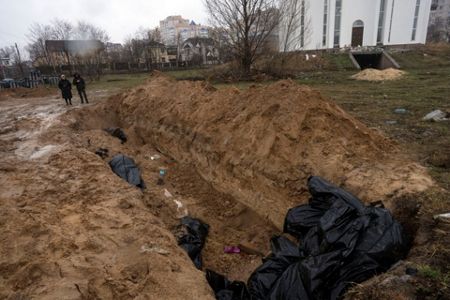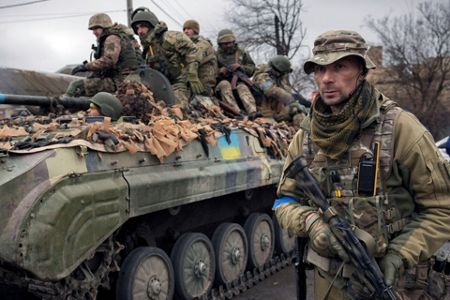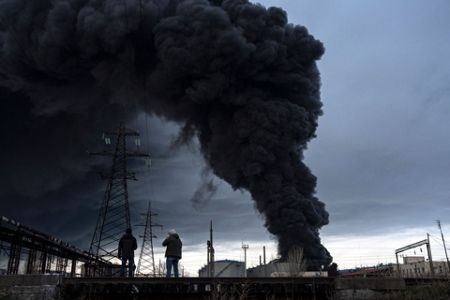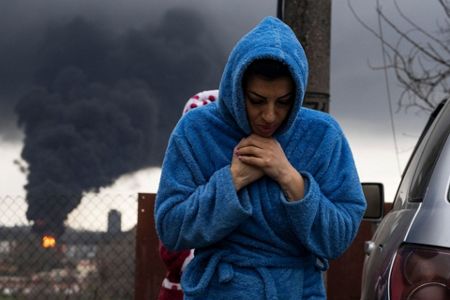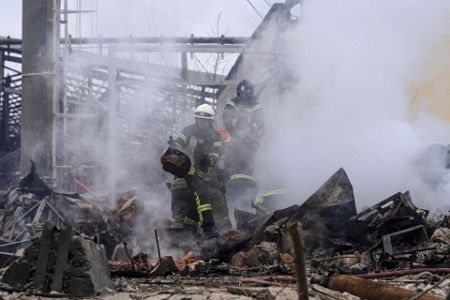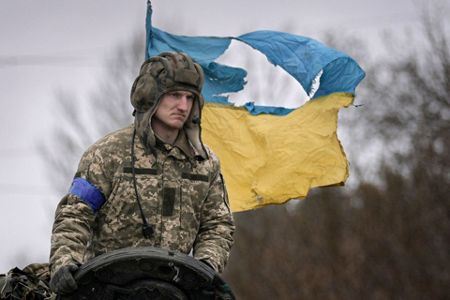BUCHA, Ukraine (AP) — Bodies with bound hands, close-range gunshot wounds and signs of torture lay scattered in a city on the outskirts of Kyiv after Russian soldiers withdrew from the area. Ukrainian authorities on Sunday accused the departing forces of committing war crimes and leaving behind a “scene from a horror movie.”
As images of the bodies — of people whom residents said were killed indiscriminately — began to emerge from Bucha, a slew of European leaders condemned the atrocities and called for tougher sanctions against Moscow.
Associated Press journalists saw the bodies of at least 21 people in various spots around Bucha, northwest of the capital. One group of nine, all in civilian clothes, were scattered around a site that residents said Russian troops used as a base. They appeared to have been killed at close range. At least two had their hands tied behind their backs and one of those was shot in the head; another's legs were bound.
Ukrainian officials laid the blame for the killings — which they said happened in Bucha and other Kyiv suburbs — squarely at the feet of Russian troops, with the president calling them evidence of genocide. But Russia’s Defense Ministry rejected the accusations as “provocation.”
The discoveries followed the Russian retreat from the area around the capital, territory that has seen heavy fighting since troops invaded Ukraine from three directions on Feb. 24. Troops who swept in from Belarus to the north spent weeks trying to clear a path to Kyiv, but their advance stalled in the face of resolute defense from Ukraine’s forces.
Moscow now says it is focusing its offensive on the country's east, but it also pressed a siege on a city in the north and continued to strike cities elsewhere in a war that has already forced more than 4 million Ukrainians to flee their country and many more to leave their homes.
Russian troops rolled into Bucha in the early days of the invasion and stayed up March 30. With those forces gone, residents gave harrowing accounts Sunday, saying soldiers shot and killed civilians without any apparent reason.
One resident, who refused to give his name fearing for his safety, said that Russian troops went building to building and took people out of the basements where they were hiding, checking their phones for any evidence of anti-Russian activity and taking them away or shooting them.
Hanna Herega, a resident of Bucha, said Russian troops shot a neighbor who had gone out to gather wood for heating.
“He went to get some wood when all of a sudden they (Russians) started shooting. They hit him a bit above the heel, crushing the bone, and he fell down,” Herega said. “Then they shot off his left leg completely, with the boot. Then they shot him all over (the chest). And another shot went slightly below the temple. It was a controlled shot to the head.”
The AP also saw two bodies, that of a man and a woman, wrapped in plastic that residents said they had covered and placed in a shaft until a proper funeral could be arranged.
The resident who refused to be identified said the man was killed as he left a home.
“He put his hands up, and they shot him,” he said.
Oleksiy Arestovych, an adviser to Ukrainian President Volodymyr Zelenskyy, said scores of residents were found slain on the streets of the suburbs of Irpin and Hostomel as well as Bucha, in what looked like a “scene from a horror movie.”
He alleged that some of the women found dead had been raped before being killed and the Russians then burned the bodies.
“This is genocide,” Zelenskyy told CBS’ “Face the Nation” on Sunday.
But Russia's Defense Ministry said in a statement that the photos and videos of dead bodies “have been stage managed by the Kyiv regime for the Western media.” It noted that Bucha's mayor did not mention any abuses a day after Russian troops left.
The ministry charged said “not a single civilian has faced any violent action by the Russian military" in Bucha.
Over the weekend, AP journalists witnessed Ukrainian soldiers gingerly removing at least six bodies from a street in Bucha with cables in case the Russians had booby-trapped corpses with explosives before their withdrawal.
Kyiv Mayor Vitali Klitschko called on other nations to immediately end Russian gas imports, saying they were funding the killings.
“Not a penny should go to Russia anymore," Klitschko told German newspaper Bild. “That’s bloody money used to slaughter people. The gas and oil embargo must come immediately.”
Officials in France, Germany, Italy, Estonia and the U.K. separately condemned what was being described and vowed that Russia would be held accountable.
“This is not a battlefield, it’s a crime scene,” Estonian Prime Minister Kaja Kallas tweeted.
Authorities said they were documenting evidence to add to their case for prosecuting Russian officials for war crimes.
As Russian forces retreated from the area around the capital, they pressed their sieges in other parts of the country. Russia has said it is directing troops to the Donbas in eastern Ukraine, where Russia-backed separatists have been fighting Ukrainian forces for eight years.
In that region, Mariupol, a port on the Sea of Azov that has seen some of the war's greatest suffering, remained cut off. About 100,000 civilians — less than a quarter of the prewar population of 430,000 — are believed to be trapped there with little or no food, water, fuel and medicine.
The International Committee of the Red Cross said Sunday that a team sent Saturday to help evacuate residents had yet to reach the city.
Ukrainian authorities said Russia agreed days ago to allow safe passage from the city, but similar agreements have broken down repeatedly under continued shelling.
A supermarket parking lot in the Ukrainian city of Zaporizhzhia, meanwhile, has become the staging ground for helping people who have made it out.
Peycheva Olena, who fled the besieged city, told Britain's Sky News she was forced to leave the body of her husband unburied when he was killed in shooting.
“There was shelling, and we tried to drag him away but it was too much, we couldn’t do it,” explained her daughter, Kristina Katrikova.
The mayor of Chernihiv, which also has been under attack for weeks, said Sunday that relentless Russian shelling has destroyed 70% of the northern city. Like in Mariupol, Chernihiv has been cut off from shipments of food and other supplies.
On Sunday morning, Russian forces launched missiles on the Black Sea port of Odesa, in southern Ukraine, sending up clouds of dark smoke that veiled parts of the city. The Russian military said the targets were an oil processing plant and fuel depots around Odesa, which is Ukraine’s largest port and home to its navy.
The Odesa city council said Ukraine’s air defense shot down some missiles before they hit the city. Ukrainian military spokesman Vladyslav Nazarov said there were no casualties from the attack.
The regional governor in Kharkiv, said Sunday that Russian artillery and tanks performed over 20 strikes on Ukraine’s second-largest city and its outskirts in the country's northeast over the past day.
The head of Ukraine’s delegation in talks with Russia said Moscow’s negotiators informally agreed to most of a draft proposal discussed during face-to-face talks in Istanbul this week, but no written confirmation has been provided.
The Ukrainian negotiator, Davyd Arakhamia said on Ukrainian TV that he hoped the proposal was developed enough so Zelenskyy and Russian President Vladimir Putin could meet to discuss it. But the top Russian negotiator in talks with Ukraine, Vladimir Medinksy, was quoted by the Interfax news agency as saying it was too early to talk about a meeting between the two leaders.
___
Yuras Karmanau in Lviv, Ukraine, and Associated Press journalists around the world contributed to this report.
___
Follow the AP’s coverage of the war at https://apnews.com/hub/russia-ukraine
Copyright 2022 The Associated Press. All rights reserved. This material may not be published, broadcast, rewritten or redistributed without permission.






